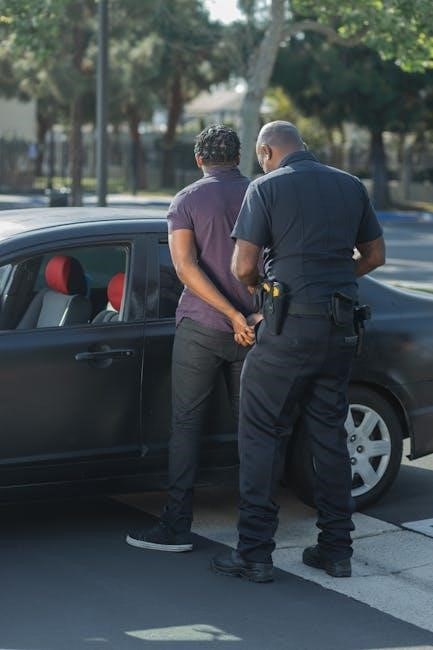Obtaining a security guard license is essential for a rewarding career in security. The test evaluates knowledge of legal issues, emergency procedures, and security protocols. PDF guides provide comprehensive study materials, ensuring thorough preparation for the exam.
1.1. Overview of the Security Guard License
The security guard license is a mandatory credential for individuals seeking to work in the security industry. Issued by state authorities, it verifies that a candidate meets specific standards, including training, background checks, and legal requirements. While some states refer to it as certification or registration, the license ensures compliance with local laws and professional competencies. It is essential for legally performing security duties, such as patrolling, enforcing rules, and responding to emergencies. The license also distinguishes qualified professionals in a competitive job market.
1.2. Importance of the Security Guard License Test
The security guard license test ensures candidates possess essential knowledge and skills to perform their duties effectively. It evaluates understanding of legal issues, emergency procedures, and professional conduct. Passing the test demonstrates competence, ensuring public safety and employer confidence. Licensing verifies adherence to state-specific laws and industry standards, maintaining professionalism within the security sector. It is a critical step for securing employment and advancing in the field, as many employers require certification. The test also upholds accountability and ethical practices among security personnel.

Eligibility Requirements for the Security Guard License Test
To qualify for the security guard license test, candidates must meet specific criteria, including age, education, and background checks. Physical fitness and legal compliance are also required.
2.1. Age and Education Requirements
Most states require security guard candidates to be at least 18 years old. A high school diploma or equivalent is typically mandatory. Some jurisdictions may accept alternative education credentials, ensuring applicants meet basic educational standards. Proper documentation must be provided during the licensing process to verify age and education. These requirements help ensure candidates are adequately prepared for the responsibilities of a security role. Compliance with these standards is essential for eligibility.
2.2. Background Checks and Legal Requirements
Background checks are mandatory for security guard licensing. Applicants must undergo criminal history checks and fingerprinting. Convictions for felonies or violent crimes may disqualify candidates. Legal requirements vary by state but generally include proof of citizenship or legal residency. Applicants must also disclose prior employment as a security guard. Failure to meet these standards can result in denied applications. Compliance with all legal requirements ensures public safety and maintains professional integrity in the security industry.
2.3. Physical and Mental Fitness Standards
Security guard applicants must meet specific physical and mental fitness standards. Physical requirements include vision tests, ability to patrol, and respond to emergencies. Mental fitness involves emotional stability, alertness, and sound judgment. Applicants must demonstrate capacity to handle stress and make quick decisions. Some states require medical clearance. These standards ensure guards can perform duties effectively and safely, maintaining public trust and operational efficiency in security roles.

Test Format and Structure
The test includes multiple-choice, true/false, and scenario-based questions. Candidates must complete the exam within a set time limit, achieving a minimum passing score to qualify for licensure.
3.1. Multiple Choice Questions
Multiple-choice questions are a key component of the security guard license test. These questions assess knowledge of security protocols, legal issues, and emergency procedures. Candidates are presented with several options, requiring careful reading to select the correct answer. The format ensures a standardized evaluation of understanding. Security guard test PDFs often include practice multiple-choice questions, allowing candidates to familiarize themselves with the structure and content. This preparation helps build confidence and improves test-taking strategies.
3.2. True or False and Scenario-Based Questions
True or False questions test factual knowledge, requiring precise understanding of security procedures and legal standards. Scenario-based questions present real-life situations, assessing how candidates apply their knowledge to practical challenges. These questions evaluate critical thinking and decision-making skills. Security guard test PDFs often include these question types, providing candidates with realistic preparation. Practicing these scenarios helps build the ability to respond effectively in actual security situations, ensuring readiness for the exam and the job.
3.3. Time Limits and Passing Scores
Security guard license tests typically have strict time limits, often 60 minutes for multiple-choice and scenario-based questions. Passing scores vary by jurisdiction but commonly require at least 70% accuracy. PDF study guides include timed practice tests, helping candidates manage their time effectively. Understanding the time constraints and scoring criteria ensures focused preparation. Proper time management and strategic guessing can improve performance. Practicing under timed conditions builds confidence and reduces exam-day anxiety, enhancing overall readiness to achieve a passing score.
Key Topics Covered in the Security Guard License Test
The test covers essential topics like general security procedures, legal issues, emergency response, and ethical conduct. These subjects ensure candidates are well-prepared for real-world scenarios.
4.1. General Knowledge and Security Procedures
General knowledge and security procedures form the foundation of the test. Candidates are assessed on understanding basic duties, patrol techniques, and access control. Topics include emergency communication, report writing, and maintaining order. The PDF guides provide detailed insights into these areas, ensuring a comprehensive understanding. Mastery of these concepts is essential for effective job performance and public safety. Key areas also cover standard protocols for securing premises and handling daily security operations efficiently.
- Patrol procedures and surveillance techniques
- Access control and visitor management
- Communication and report writing skills
- Understanding security equipment and tools
These topics ensure candidates are well-prepared for real-world scenarios in the security field.
4.2. Legal Issues and Code of Conduct
Understanding legal issues and the code of conduct is critical for security guards. The test covers laws related to arrest, search, and seizure, as well as ethical standards. Candidates must know their authority limits and legal responsibilities. The PDF guides detail scenarios and case studies to help grasp these concepts. Proper adherence to the code of conduct ensures professionalism and avoids legal consequences. Topics include privacy rights, use of force, and handling evidence correctly.
- Authority and limitations of security personnel
- Use of force and legal implications
- Privacy rights and ethical standards
- Legal documentation and evidence handling
Mastery of these areas ensures compliance with laws and maintains public trust.
4.3. Emergency Procedures and Response
Security guards must be prepared to handle emergencies like fires, medical situations, and natural disasters. The test assesses knowledge of evacuation protocols, first aid, and communication during crises. PDF guides provide scenarios and best practices for effective response. Understanding emergency procedures ensures safety and minimizes risks. Topics include fire extinguisher use, crisis communication, and crowd control techniques. Proper training and quick decision-making are vital in emergency situations.
- Evacuation and emergency exit procedures
- First aid and medical emergency response
- Fire safety and extinguisher operation
- Crisis communication and crowd management
Mastering these skills is essential for protecting people and property during critical events.
The Role of PDF Study Guides
PDF study guides are essential for exam preparation, offering comprehensive materials on security guard licensing. They cover critical areas like legal issues and emergency procedures, ensuring convenience and flexibility for candidates to study effectively.
5.1. Benefits of Using Security Guard Test PDFs
Security guard test PDFs offer a comprehensive and convenient way to prepare for the licensing exam. They provide detailed study materials, including sample questions, answers, and explanations, covering key topics like legal issues, emergency procedures, and general security knowledge. PDFs are easily accessible, allowing candidates to study offline and at their own pace. They also help identify weak areas, enabling focused preparation. With their flexibility and thorough coverage, PDF guides are an invaluable resource for achieving success on the security guard license test.
5.2. How to Effectively Use PDF Resources for Preparation
To maximize the benefits of security guard test PDFs, create a structured study plan. Start by reviewing the entire document to understand the content layout. Focus on key sections like legal issues, emergency procedures, and security protocols. Practice sample questions regularly and review explanations to reinforce understanding. Utilize the flexibility of PDFs to study anywhere, even offline. Highlight important points and take notes for quick revision. By systematically working through the material, candidates can ensure comprehensive preparation and improve their chances of passing the exam confidently;

State Licensing Rules and Regulations
State licensing rules vary, with some requiring certifications or registrations instead of licenses. Research local regulations to ensure compliance with specific training, background checks, and legal standards.
6.1. Variations in Licensing Requirements Across States
Licensing requirements for security guards vary significantly across states. Some states refer to it as certification or registration rather than a license. For example, California requires 40 hours of training, while Texas mandates 30 hours. Background checks and age requirements also differ; New York requires applicants to be at least 18, while Florida allows 18-year-olds with parental consent. Additionally, certain states impose stricter rules for armed guards compared to unarmed ones. These variations highlight the importance of understanding specific state regulations before applying for a security guard license.
6.2. Understanding State-Specific Laws and Policies
Each state enforces unique laws and policies for security guard licensing, requiring candidates to understand local regulations. For example, some states mandate specific training hours, while others require additional certifications like CPR. Legal penalties for violations also vary, with certain states imposing fines or jail time. Additionally, armed and unarmed guards face different legal standards. It’s crucial to research and comply with state-specific requirements to ensure eligibility and avoid legal issues. Understanding these laws is essential for a smooth licensing process and professional compliance.

Sample Questions and Answers
Sample questions and answers in PDF guides provide insights into test formats, helping candidates prepare for topics like legal issues, emergency procedures, and security protocols effectively.
7.1. General Knowledge Sample Questions
General knowledge questions assess basic understanding of security principles. Examples include identifying primary duties, understanding legal boundaries, and recognizing emergency protocols. Questions may ask about patrolling techniques, communication skills, and conflict resolution. True/false and scenario-based queries test practical application. PDF guides offer sample questions, such as “What are the main responsibilities of a security guard?” or “How should you respond to a fire alarm?” These examples help candidates understand the test format and build confidence in their knowledge of fundamental security practices. The Security Officer Network provides comprehensive PDF resources for effective preparation.
7.2. Legal Issues and Code of Conduct Sample Questions
Legal questions focus on understanding laws and ethical standards. Sample topics include the Private Security Investigative Services Act, code of conduct violations, and penalties for misconduct; Questions may ask, “What is the maximum penalty for violating the code of conduct?” or “Which act governs private security services?” PDF guides provide answers and explanations, ensuring candidates comprehend legal responsibilities and professional ethics. These questions prepare security guards to operate within legal boundaries and maintain high standards of professionalism while on duty. Proper understanding of these concepts is crucial for passing the exam and maintaining licensure. Additionally, scenario-based questions test practical application of legal knowledge in real-world situations, ensuring guards can make informed decisions. The Security Guard Test Questions and Answers PDF offers detailed insights into these areas, aiding thorough preparation. By mastering legal issues, candidates can confidently navigate the complexities of their role and uphold the integrity of the security profession. Effective study materials, like those found in the PDF, are essential for success in this critical section of the test.
7.3; Emergency Procedures Sample Questions
Emergency procedure questions assess a candidate’s ability to respond to critical situations. Sample topics include fire response, first aid, and evacuation protocols. Questions may ask, “What steps should a security guard take during a fire emergency?” or “How should one handle a medical emergency on-site?” PDF guides provide detailed answers and scenarios, ensuring candidates are prepared to act decisively. These questions evaluate practical knowledge of emergency protocols, ensuring guards can protect people and property effectively. Understanding these procedures is vital for maintaining safety and order in high-pressure situations. The Security Guard Test Questions and Answers PDF offers comprehensive practice questions, helping candidates master emergency response techniques. By studying these materials, aspiring guards can confidently address emergencies, ensuring the safety of others and adhering to professional standards. Effective preparation in this area is essential for passing the exam and excelling in real-world scenarios. The PDF resources are designed to simulate real-life challenges, providing a thorough understanding of emergency procedures. This section of the test ensures that security guards are equipped to handle crises efficiently and responsibly. Accurate knowledge of emergency protocols is a cornerstone of effective security operations.
Preparation Tips and Strategies
Utilize PDF study guides for comprehensive preparation. Focus on understanding test formats and key topics. Practice with mock tests to improve time management and reduce exam stress. Stay calm and focused during the test to ensure optimal performance. Regular study sessions and effective note-taking are essential for success.
8.1. Recommended Study Materials and Resources
PDF study guides are highly recommended for preparing for the security guard license test. They offer comprehensive coverage of key topics such as legal issues, emergency procedures, and general security protocols. Utilize mock tests and practice questions to familiarize yourself with the exam format. Additionally, online courses and training modules provide in-depth knowledge and practical insights. Focus on materials that include scenario-based questions and true/false formats to enhance your understanding. Regular practice with these resources ensures confidence and readiness for the test.
8.2; Time Management and Test-Taking Techniques
Effective time management is crucial for success in the security guard license test. Allocate time wisely, skimming through questions to identify easier ones first. For multiple-choice questions, eliminate incorrect options to increase chances of selecting the right answer. Practice scenario-based questions by understanding the context thoroughly. Stay calm and focused, avoiding panic, which can hinder performance. Use the remaining time to review unanswered questions and ensure all responses are finalized. Proper test-taking techniques enhance accuracy and confidence, leading to better overall results.
The Difference Between Armed and Unarmed Security Guard Tests
The armed security guard test includes questions on firearm laws and advanced procedures, while the unarmed test focuses on general security protocols and emergency response.
9.1. Unarmed Security Guard Test Requirements
The unarmed security guard test assesses knowledge of general security procedures, legal issues, and emergency response. It typically includes multiple-choice questions and scenario-based problems. Candidates must demonstrate understanding of protocols like patrolling, access control, and conflict resolution. Study materials, such as PDF guides, are highly recommended for preparation. The test may vary by state, but core topics remain consistent. Passing ensures eligibility for an unarmed security license, allowing individuals to work in roles requiring basic security responsibilities without firearm authorization.
9.2. Armed Security Guard Test Requirements
The armed security guard test is more rigorous, focusing on firearm safety, laws, and advanced security protocols. It includes multiple-choice and scenario-based questions. Candidates must demonstrate proficiency in weapon handling and legal knowledge. Additional training and background checks are often required. PDF study guides are essential for preparation, covering topics like use of force and emergency response. Passing the test and meeting state-specific requirements grants the armed security license, enabling work in high-risk environments requiring firearm authorization and advanced security skills.
Final Tips for Passing the Security Guard License Test
Utilize PDF study guides for comprehensive preparation, engage in mock tests, and review all key topics. Stay calm and focused during the exam to ensure success.
10.1. Practicing with Mock Tests
Practicing with mock tests is a proven strategy to excel in the security guard license exam. Mock tests simulate real exam conditions, helping candidates familiarize themselves with the format and time constraints. They also identify weak areas, allowing focused study. Many mock tests are available in PDF formats, offering convenience and accessibility. Regular practice builds confidence and reduces exam anxiety. By mastering mock tests, candidates can refine their test-taking skills and ensure readiness for the actual exam.
10.2. Staying Calm and Focused During the Exam
Remaining calm and focused during the security guard license test is crucial for optimal performance. Techniques such as deep breathing, positive visualization, and time management can help maintain composure. Skimming through questions first ensures familiarity with the exam structure. Prioritizing easy questions builds confidence before tackling more challenging ones. Staying hydrated and well-rested also supports mental clarity. By managing stress and maintaining concentration, candidates can approach the test with confidence and achieve their best results.
